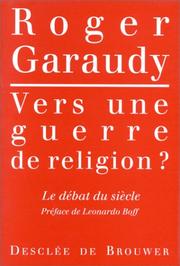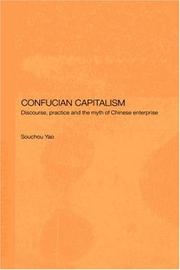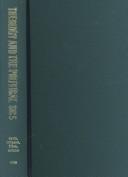| Listing 1 - 8 of 8 |
Sort by
|
Book
ISBN: 194901357X 9781949013573 9781949013559 1949013553 Year: 2019 Publisher: Steubenville, Ohio : Emmaus Road Publishing,
Abstract | Keywords | Export | Availability | Bookmark
 Loading...
Loading...Choose an application
- Reference Manager
- EndNote
- RefWorks (Direct export to RefWorks)
"If we don't get Sunday right, we won't get Monday--or any day of the workweek--right. The divided life is a temptation so built into our society, we may not even recognize it. Yet most of us fall prey to it. We either undervalue work, resenting it as simply a job, or we overvalue it as an identity-defining career. Michael Naughton, drawing on his background in both business and theology, proposes that the key to finding balance is another important human activity: leisure. In light of leisure--not mere amusement, but time for family, silence, prayer, and above all, worship--work becomes a space where men and women can find deep fulfilment. Naughton provides real-world examples of how businesses can promote authentic human flourishment and innovation through practices and policies that support leisure. In Getting Work Right Michael Naughton will change how you work--and rest." -- Publisher's description.
Business ethics. --- Business --- Capitalism --- Culture conflict --- Religious aspects. --- Religious aspects --- Catholic Church. --- Religion and capitalism --- Businesspeople --- Commercial ethics --- Corporate ethics --- Corporation ethics --- Professional ethics --- Wealth --- Moral and ethical aspects
Book
ISBN: 9780313377785 Year: 2009 Publisher: Westport, Connecticut Praeger Publishers
Abstract | Keywords | Export | Availability | Bookmark
 Loading...
Loading...Choose an application
- Reference Manager
- EndNote
- RefWorks (Direct export to RefWorks)
mega-churches --- America --- religion --- congregations --- religion and Church --- places of worship --- Christianity --- belief systems --- organized religion --- religion and capitalism --- religious tradition --- social science --- church-leaders --- American Christianity --- rituals --- religious practices

ISBN: 2220036073 9782220036076 Year: 1995 Publisher: Paris : Desclée de Brouwer (DDB),
Abstract | Keywords | Export | Availability | Bookmark
 Loading...
Loading...Choose an application
- Reference Manager
- EndNote
- RefWorks (Direct export to RefWorks)
Capitalism --- Religion --- Religious aspects. --- History --- 241.65*3 --- -Religion --- -Religion, Primitive --- Atheism --- God --- Irreligion --- Religions --- Theology --- Market economy --- Economics --- Profit --- Capital --- Theologische ethiek: internationale rechtvaardigheid --- Religious aspects --- -241.65*3 --- -Theologische ethiek: internationale rechtvaardigheid --- 241.65*3 Theologische ethiek: internationale rechtvaardigheid --- -Capitalism --- -241.65*3 Theologische ethiek: internationale rechtvaardigheid --- Religion, Primitive --- Religion and capitalism --- Capitalism - Religious aspects. --- Religion - History - 20th century.

ISBN: 0700715835 1138863432 020303743X 1136127941 1283970406 9781136127946 9780203037430 9780700715831 9781283970402 9781136128028 9781136128103 9781138863439 1136128026 Year: 2002 Publisher: Richmond Routledge Curzon
Abstract | Keywords | Export | Availability | Bookmark
 Loading...
Loading...Choose an application
- Reference Manager
- EndNote
- RefWorks (Direct export to RefWorks)
The discourse of Confucian Capitalism has been crucial in shaping our understanding of the brilliant economic successes of the Chinese diaspora all over the world. From this perspective, hard work, family values, and communal cohesion, as well as business practices based on sentiment, trust, and social networks, are the legendary means of explaining the wealth and commercial talent of these remarkable people. The book examines the subject of Chinese business' by exposing the enduring myth about the determining effects of these values and practices supposedly derived from Confucianism. Such myt
S10/1000 --- S10/0600 --- S10/0260 --- S11/0570 --- China: Economics, industry and commerce--Business ethics and philosophy --- China: Economics, industry and commerce--Foreign trade and economic relations: general --- China: Economics, industry and commerce--The Chinese model --- China: Social sciences--Guanxi --- Religion and capitalism --- Capitalism --- Business enterprises --- Confucianism --- Religious aspects.
Book
ISBN: 1438464169 9781438464169 9781438464152 1438464150 Year: 2017 Publisher: Albany, New York : SUNY Press,
Abstract | Keywords | Export | Availability | Bookmark
 Loading...
Loading...Choose an application
- Reference Manager
- EndNote
- RefWorks (Direct export to RefWorks)
Max Weber's account of the rise of capitalism focused on his concept of a Protestant ethic, valuing diligence in earning and saving money but restraint in spending it. However, such individual restraint is foreign to contemporary understandings of finance, which treat ever-increasing consumption and debt as natural, almost essential, for maintaining the economic cycle of buying and selling.In The Debt of the Living, Elettra Stimilli returns to this idea of restraint as ascesis, by analyzing theological and philosophical understandings of debt drawn from a range of figures, including Saint Paul, Schmitt and Agamben, Benjamin and Marx, Nietzsche and Freud, and Foucault. Central to this analysis is the logic of "profit for profit's sake"—an aspect of Weber's work that Stimilli believes has been given insufficient attention. Following Foucault, she identifies this as the original mechanism of a capitalist dispositif that feeds not on a goal-directed rationality, but on the self-determining character of human agency. Ascesis is fundamental not because it is characterized by renunciation, but because the self-discipline it imposes converts the properly human quality of action without a predetermined goal into a lack, a fault, or a state of guilt: a debt that cannot be settled. Stimilli argues that this lack, which is impossible to fill, should be seen as the basis of the economy of hedonism and consumption that has governed global economies in recent years and as the premise of the current economy of debt.
Capitalism --- Religion and sociology. --- Asceticism. --- Ascetical theology --- Contempt of the world --- Theology, Ascetical --- Christian life --- Ethics --- Religion and society --- Religious sociology --- Society and religion --- Sociology, Religious --- Sociology and religion --- Sociology of religion --- Sociology --- Religion and capitalism --- Religious aspects. --- Religion and sociology --- Asceticism --- Religious aspects --- E-books

ISBN: 0822334607 0822334720 Year: 2005 Publisher: Durham Duke university press
Abstract | Keywords | Export | Availability | Bookmark
 Loading...
Loading...Choose an application
- Reference Manager
- EndNote
- RefWorks (Direct export to RefWorks)
Capitalism --- Christianity and politics. --- Religion and politics. --- Religious aspects --- Christianity. --- Religious aspects. --- 261.7 --- De Kerk en de burgerlijke macht: Kerk en Staat; godsdienstvrijheid; verdraagzaamheid; tolerantie:--theologische aspecten --- 261.7 De Kerk en de burgerlijke macht: Kerk en Staat; godsdienstvrijheid; verdraagzaamheid; tolerantie:--theologische aspecten --- Christianity and politics --- Religion and politics --- Political science --- Politics, Practical --- Politics and religion --- Religion --- Religions --- Christianity --- Church and politics --- Politics and Christianity --- Politics and the church --- Market economy --- Economics --- Profit --- Capital --- Religion and capitalism --- Religious aspects&delete& --- Political aspects
Book
ISBN: 3319323326 3319323334 Year: 2017 Publisher: Cham : Springer International Publishing : Imprint: Palgrave Macmillan,
Abstract | Keywords | Export | Availability | Bookmark
 Loading...
Loading...Choose an application
- Reference Manager
- EndNote
- RefWorks (Direct export to RefWorks)
This book analyses the bearing of global monotheistic faiths towards the philosophy and practice of record keeping and accounting throughout history. The author offers a comprehensive discussion of the literal and figurative processes of taking account and ascribing accountability that link religions such as Christianity, Judaism and Islam. Chapters address theology and accounting in tandem with social behaviours to demonstrate how auditing and calculating customs permeate practising religions. This book first highlights how the four monotheisms have viewed and incorporated accounting historically, and then looks forward to the accounting debates, technologies and traditions in today’s world that derive from these religious customs. Drawing heavily on the writings of Max Weber and Werner Sombart, the author demonstrates that accounting and capitalism have religious roots far beyond the Protestant ethic.
Finance--History. --- Financial Accounting. --- Financial History. --- Religion and Society. --- Religion and capitalism --- Finance. --- Christianity. --- Islam. --- Judaism. --- Religion and sociology. --- Accounting. --- Capitalism --- Religious aspects. --- Finance --- History. --- Mohammedanism --- Muhammadanism --- Muslimism --- Mussulmanism --- Religions --- Muslims --- Christianity --- Church history --- Jews --- Semites --- Religion and society --- Religious sociology --- Society and religion --- Sociology, Religious --- Sociology and religion --- Sociology of religion --- Sociology --- Accountancy --- Business enterprises --- Commerce --- Commercial accounting --- Financial accounting --- Business --- Bookkeeping --- Religion --- Accounting --- Finance—History.
Book
ISBN: 9780593317983 059331798X 9780593317990 Year: 2021 Publisher: New York, N.Y. Alfred A. Knopf
Abstract | Keywords | Export | Availability | Bookmark
 Loading...
Loading...Choose an application
- Reference Manager
- EndNote
- RefWorks (Direct export to RefWorks)
"Where do our ideas about economics and economic policy come from? Critics of contemporary economics complain that belief in free markets, among economists and many ordinary citizens too, is a form of religion. It turns out that there is something to the idea: not in the way the critics mean, but in a deeper, more historically grounded sense. Contrary to the conventional historical view of economics as entirely a secular product of the Enlightenment, religion exerted a powerful influence from the outset. Benjamin M. Friedman demonstrates that the foundational transition in thinking about what we now call economics, beginning in the eighteenth century, was decisively shaped by the hotly contended lines of religious thought within the English-speaking Protestant world. Beliefs about God-given human character, about our destiny after this life, and about the purpose of our existence, were all under challenge in the world in which Adam Smith and his contemporaries lived. Those debates explain the puzzling behavior so many of our fellow citizens whose views about economic policies, and whose voting behavior too, seems sharply at odds with what would be to their own economic benefit. Understanding the origins of the relationship between religious thinking and economic thinking, together with its ongoing consequences, provides insights into our current economic policy debates and ways to shape more functional policies for all citizens"--
Economics --- Religious thought --- Capitalism --- Religion and capitalism --- Religion and economics --- Religious aspects --- History --- Sociology of religion --- Economic order --- E-books --- 241.65*5 --- 174.5 --- 241.67 --- 241.67 Business ethics. Corporate ethics. Bedrijfscodes. Management en ethiek. Zakenmoraal --- Business ethics. Corporate ethics. Bedrijfscodes. Management en ethiek. Zakenmoraal --- 174.5 Economische ethiek. Speculatie --- Economische ethiek. Speculatie --- 241.65*5 Theologische ethiek: private eigendom; diefstal; armoede --- Theologische ethiek: private eigendom; diefstal; armoede
| Listing 1 - 8 of 8 |
Sort by
|

 Search
Search Feedback
Feedback About UniCat
About UniCat  Help
Help News
News